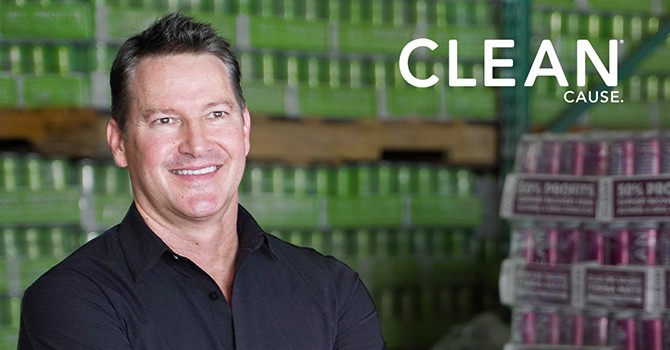Sparkling yerba mate beverage brand CLEAN Cause announced today that it has named former Red Bull executive Chad Peffer as its president and chief commercial officer, a move with an eye toward helping the brand scale operations in the coming months.
Based in Texas, CLEAN Cause was founded by CEO Wes Hurt, a former drug user in recovery who formed the company as a means of bringing awareness to addiction issues. The brand donates 50% of all profits to sober living scholarship programs and also employs other individuals in recovery.
Calling himself more of a “firestarter” than a “maintainer,” Hurt told BevNET that Peffer will handle much of the logistics and strategic planning of the company while he will focus on driving the message and mission. In the coming year, Hurt aims to launch a podcast for the brand which he would host, secure speaking engagements and seek out opportunities to partner with other corporations looking for ways to support mental health and addiction treatment.
“Addiction is something that people are crying about more often than not,” he said. “I want to make people smile. I want to turn it up. I want to inspire folks…. That is what I want to do, that is what I will do. I’m going to get out there and I’m going to come back to the heart of the brand and the reason for being and let the professionals who’ve had the experience, and who have done this before, do it over again.”
Peffer previously worked at Red Bull for 21 years, including three years as EVP of sales and distribution from 2016 until he left the brand in 2019. He since spent the past year working as a consultant before connecting with CLEAN Cause through LinkedIn this summer, seeking to join the company.
“CLEAN has one of the strongest brand propositions and commitment that I have ever seen,” Peffer said in a press release. “If other CPG brands, or any manufacturing company for that matter, donated 50% of their profits to any cause, the world would be a better place. As a consumer, it’s a simple proposition – a great, functional product with an unmatched business model. I’ll be the first to admit that I’m a capitalist… but a capitalist with a Cause.”
Peffer joins CLEAN Cause as the company prepares to grow north of 6,000 retail doors nationwide. The brand is currently available in over 40 DSD distributors on the West Coast. Hurt added that the company is anticipating 50% year-over-year revenue growth for 2020. He said the brand currently has “thousands of authorizations” but is continuing to take a “mile deep, inch wide” approach and has passed on several major retail chains in order to maintain this strategy.
Last year, CLEAN Cause raised $7 million in a Series A round intended to support retail growth and new innovation. In March, the company launched a zero calorie line that includes Berry Mint, Cherry Lime and Orange Ginger flavors.
However, the company is also losing a key member of its team — VP of sales and distribution Sam Wilson, also a former Red Bull and Bang Energy veteran, who Hurt credited with helping establish the brand’s current growth trajectory. Wilson will depart CLEAN Cause for another opportunity, he said.
Though categorized as a yerba mate, Hurt said CLEAN Cause is positioning the brand as offering “better caffeine,” as well as emphasizing its social mission, rather than trying to educate around yerba mate as an ingredient. As the brand focuses on the energy need state, Peffer is just one of many on the nearly 50-person team who brings experience in the energy drink category — including VP of marketing Donovan Dresti (formerly Red Bull) and director of sales Teyo Brandwell (formerly VPX Pharmaceuticals).
According to Hurt, however, CLEAN Cause has found that it can drive sales by avoiding intra-category competition and instead focusing on the brand’s social mission, which draws in new consumers.
“If I’ve realized and learned anything, it’s how powerful our cause is in introducing people to the brand,” Hurt said. “Then once they have an intimate understanding of the cause, now they can get more educated about the product or the specific ingredients or whatever. But sometimes I’ll just tell people don’t sell yerba mate. Instead say ‘come for the cause, come back for the quality.’”
